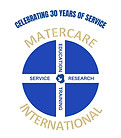Charter of Maternal Rights marks 13 years
- MaterCare International

- Oct 22, 2025
- 3 min read
This year, MaterCare International marks the thirteenth anniversary of the Charter of Mothers’ Rights, a landmark document that continues to guide our mission to serve mothers, protect life, and uphold the dignity of women across the world.
When the Charter was first promulgated in 2012, it was more than a policy statement, it was a call to conscience. Rooted deeply in the teachings of the Catholic Church and the words of St. John Paul II, the Charter affirms what we at MaterCare have always believed: that every mother’s life is sacred, every child is a gift, and every society is called to protect both.
In every corner of the world, mothers face the profound challenges of pregnancy and childbirth, sometimes in conditions that deny their most basic human rights. Each year, hundreds of thousands of women die bringing forth new life, most of them in developing countries. Behind every statistic is a face, a family, a story cut short.
The Charter of Mothers’ Rights was written to confront this tragedy, to remind the world that maternal health is a human right, not a privilege. It draws from universal principles of human dignity and Catholic social teaching, proclaiming that “Motherhood and childhood are entitled to special care and assistance” (Universal Declaration of Human Rights, Article 25).
At its heart, the Charter affirms that every mother has a right to life, to health care, to safety in childbirth, and to the freedom to welcome her child without fear or coercion. It recognizes motherhood as one of humanity’s greatest vocations, a sincere gift of self, as St. John Paul II described in Mulieris Dignitatem. A mother’s openness to life, her strength, her compassion, and her capacity to love are not only vital for her family but foundational for every healthy society. Yet, as the Charter reminds us, this dignity is often denied, through neglect, violence, abortion, poverty, and policies that fail to respect both mother and child.
For thirteen years, MaterCare International has worked tirelessly to make the Charter’s vision a reality through our model of rural maternal care, serving some of the world’s most underserved communities. Our initiatives bring skilled obstetrical care, training, and hope to mothers who otherwise face pregnancy in isolation and danger. We have seen firsthand that when a mother receives the care and respect she deserves, entire families and communities are transformed. The Charter’s guiding principles, the right to life, subsidiarity, solidarity, and the common good, continue to shape every project we undertake. They remind us that progress must begin at the local level, with compassion, competence, and respect for human dignity.
As we commemorate this thirteen-year milestone, MaterCare renews its call for what our founders once described as a “Marshall Plan for Mothers.” Just as the world rebuilt after the devastation of war, we must now rebuild our moral and medical commitment to mothers, ensuring that no woman dies giving life, and no child is denied the love of a mother. This is not merely a healthcare issue; it is a matter of justice, faith, and solidarity.
We give thanks for the countless Catholic obstetricians, midwives, health workers, and supporters who have embodied the Charter’s spirit in their daily work, serving mothers with competence, conviction, community, and compassion. We honor the mothers who have inspired this mission through their courage, faith, and love. And we reaffirm our pledge: to serve every mother and child with dignity and compassion, in the name of life and love.
Thirteen years on, the Charter of Mothers’ Rights stands not as a relic, but as a living document, one that continues to speak powerfully in a world still marked by inequality and indifference. MaterCare International remains steadfast in its mission to protect life, empower mothers, and build a world where motherhood is cherished, not threatened.
We invite you to join us in this sacred work, in prayer, advocacy, and service, as we look ahead to the next chapter of this vital mission.
“We know enough to act now. It could be done; it ought to be done; and in the name of social justice and human solidarity, it must be done.” - Dr. Halfdan Mahler, WHO Director-General (1987)




Comments